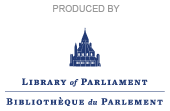A Week in the House of Commons

In the federal Parliament, the Members of the House of Commons (MPs) meet under the watchful eye of the Speaker and the TV cameras to discuss national issues and decide on legislation affecting almost every aspect of Canadians’ lives. In order to deal with the wide range of issues and ensure that all opinions can be expressed, MPs follow an established daily schedule in the House.
The following agenda illustrates a typical week in the House of Commons. The various activities on the agenda are explained in a mini-dictionary. To identify each activity, symbols in the mini-dictionary correspond to symbols in the agenda. Caucus, although not an official part of House business, is shown on this agenda because it is an important part of the week on Parliament Hill.

![]() PDF version of chart (53.6 KB)
PDF version of chart (53.6 KB)
 Adjournment Proceedings
Adjournment Proceedings
A Member who is dissatisfied with a reply received in Question Period can ask, in writing, for the matter to be raised again during the adjournment proceedings. A Cabinet Minister or Parliamentary Secretary responds.
 Caucus
Caucus
Daily House business does not begin until 2:00 p.m. on Wednesdays so that Members can attend a meeting of their respective political parties in the mornings. In these meetings, known as caucus, Senators and MPs who belong to the same political party meet to discuss policy and the parliamentary agenda. Caucuses are closed meetings and there are rules of secrecy.
 Government Orders
Government Orders
Government orders are any items of business (such as motions or bills) that the Government initiates and places on the agenda of the House under the heading “Government Orders”.
 Members’ Statements
Members’ Statements
Members can make statements on matters of importance to them for up to one minute.
 Notices of Motions for the Production of Papers
Notices of Motions for the Production of Papers
Members can ask the Government to present certain documents to the House of Commons. The Government can respond to these requests when this item is called.
 Oral Questions
Oral Questions
This closely watched 45 minutes is also known as Question Period. It is a chance for opposition MPs, and sometimes Members of the governing party, to seek information from the Government. In a strict legal sense, “the Government” is the Prime Minister and the other Cabinet Ministers. The Cabinet determines priorities and policies, ensures their implementation, and presents legislation to Parliament for approval. By questioning the Prime Minister and the other Cabinet Ministers, Members can call the Government to account for its actions.
 Private Members’ Business
Private Members’ Business
Private Members – those who do not hold an official position, such as a Cabinet Minister, Parliamentary Secretary, or Speaker – can present bills and motions for debate during Private Members’ Business. The order in which Members can present their items of business is established in a random draw at the opening of Parliament. Thirty items are then put on an Order of Precedence. All private Members’ bills and motions on the Order of Precedence are votable, unless they are determined to violate certain criteria.
 Routine Proceedings
Routine Proceedings
Routine Proceedings covers many different items. These include the tabling of documents, statements by Ministers, presentation of petitions and committee reports, introduction and first reading of bills, and debating of motions.

